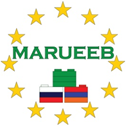Master Degree in Innovative Technologies in Energy Efficient Buildings for Russian & Armenian Universities and Stakeholders – “MARUEEB” ERASMUS+ project is successfully continuing. One of the main objectives of the project is to establish and develop a new MSc program on INNOVATIVE TECHNOLOGIES in ENERGY EFFICIENT BUILDINGS for 3 Russian Universities and 2 Armenian Universities with affiliation to other 2 Russian Universities, according to student-focused or output-based approach (http://marueeb.sti.urfu.ru/en).
20 partners from various countries (Italy, Romania, Slovakia, Lithuania, Russia, and Armenia) are participated in the project activities. Project coordinator – University of Genoa (Italy). In Lithuania, main project activities are performed by KTU Institute of Environmental Engineering (APINI) and School of Economics and Business.
During December 2017 – May 2018, KTU APINI Assoc Prof Dr Irina Kliopova conducted intensive courses “Energy efficiency through Sustainable industrial development” for master’s students from 4 Russian Universities: Ural Federal University named after the first President of Russia B.N.Yeltsin (in Yekaterinburg), Peter the Great St. Petersburg Polytechnic University, Voronezh State University of Architecture and Civil Engineering and Tambov State Technical Universities.
Participants – students and lecturers from construction and architecture, applied ecology, environmental and civil engineering faculties of the above mentioned universities. Topics that were pre-selected by master’s students:
Examples of successful implemented projects in are of regional municipal waste management in Lithuania were presented. Particular attention has been devoted to the very important issue – the proper management of municipal biodegradable waste by exploiting their energy and material potential.


